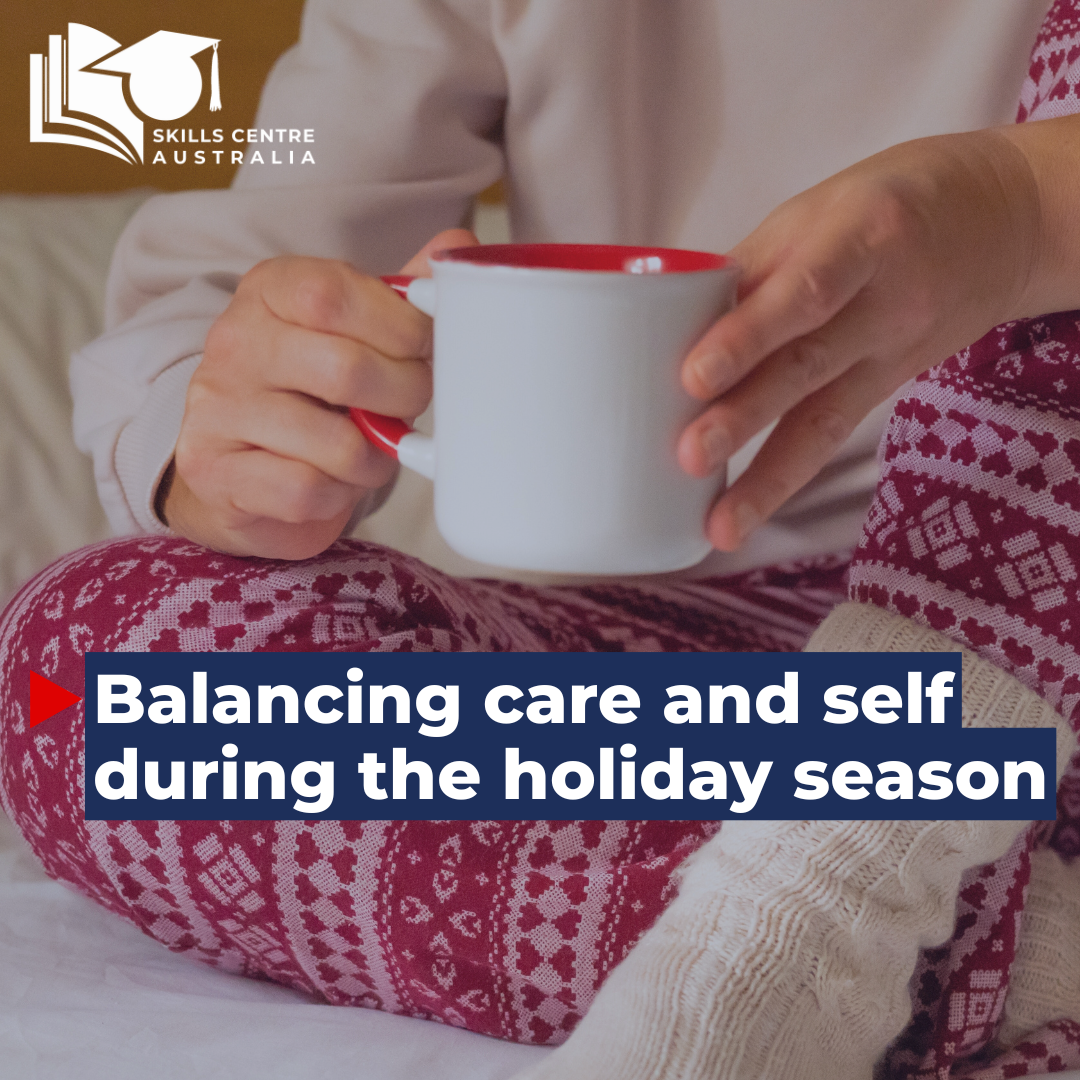For many care workers, the holiday season is a paradox: a time of goodwill and connection, but also a period of long hours, emotional strain, and blurred boundaries between work and personal life. When clients celebrate, workers may feel pressure to ‘be on’ relentlessly. Yet sustaining quality care through December demands a different mindset—one that honours both duty to others and duty to self.
Recognising these challenges, Skills Centre Australia is shining a light on this issue to recognise the vital role care workers play and the unique pressures they face during the festive season. By sparking conversation around balance, wellbeing, and professional care, the organisation aims to acknowledge the humanity behind the work and remind those in the sector their wellbeing matters too.

The hidden toll of holiday care
Caring professionals are emotionally intense by design, and that intensity can escalate during holiday seasons. Rosters often swell to cover extra leave, clients may express greater emotional need or loneliness, and the usual rituals around rest and celebration shift or vanish. Staff may skip their own family gatherings, forgo rest, or feel guilt when stepping out of care mode. Over time, this imbalance can contribute to burnout, emotional exhaustion, and diminished empathy.
Australia’s evolving policy landscape is beginning to reflect this risk. For example, new provisions around the right to disconnect are being introduced to protect workers from after-hours intrusion. At the same time, research consistently shows that when workers lack clarity over boundaries or experience persistent emotional overwork, rates of stress, sleep disturbances, and health decline rise.
The challenge for care workers is not just managing rostering or leave, it is preserving mental resilience while remaining fully present for those in their care.
A framework for holiday self-care in support roles
To help avoid the holiday stress trap, some evidence-informed strategies can make a difference. These include:
Boundaries as an act of care:
Declare ‘off hours’ where communications or administrative tasks are paused. The newer ‘right to disconnect’ laws in Australia are emblematic of recognising those boundaries. Even in caregiving roles, delineating when you are ‘on duty’ versus ‘off duty’ is critical to mental recharge.
Micro breaks and ritual anchors:
You may not control your shift times, but you can build small rituals: a five-minute breathing exercise, a moment of gratitude, a short walk.
Peer support and debriefing:
Encouraging structured debriefs with colleagues creates space to share emotional load, tips, and empathy. It transforms isolation into a shared experience. Some organisations schedule ‘wellbeing check-ins’ after high-stress periods or long shifts to normalise asking for emotional support.
Intentional holiday planning ahead
Care workers can plan for holiday periods by applying for time off early, negotiating shift swaps well in advance, and mapping ‘white space’ into calendars. Strategically pairing leave with public holidays can stretch rest time without overburdening teams.
Pro self-care routines
Sleep hygiene, healthy nutrition, movement (even small acts like keeping a gratitude journal) matter more during high-stress periods. These practices reinforce emotional reserves, so you are not giving from an empty cup.

Why this matters for clients
When care workers are depleted, care quality suffers. Mistakes, emotional detachment, reduced patience, and even absenteeism, rise when workers are worn out. On the other hand, when workers sustain their energy and self-respect, clients benefit from steadier, more compassionate, more present relationships. The ripple effect is better outcomes, stronger trust, fewer rehospitalisations, and more positive continuity of care.
At its core, good care requires two concurrent acts: caring for others and caring for oneself. Especially in the holiday season, finding the balance is not indulgence, it is essential.
Skills Centre Australia continues to highlight these conversations as part of our commitment to supporting a skilled, informed a resilient workforce. By encouraging reflection, we aim to remind care workers that professional strength is built not only through technical skill, but through compassion; for clients and for themselves.
To enrol in any of our courses, contact our friendly staff on (08) 8340 6875, email us info@kcskillscentre.com.au, or visit our website.

